Related Research Articles
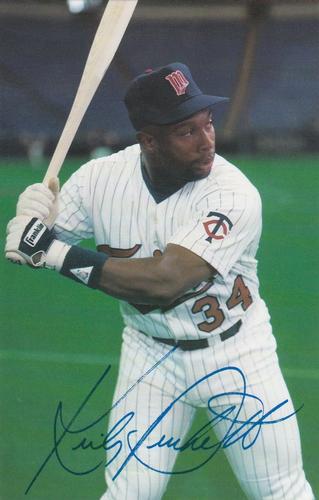
Kirby Puckett was an American professional baseball player. He played his entire 12-year Major League Baseball (MLB) career for the Minnesota Twins (1984–1995). Puckett was instrumental in helping the Twins to win World Series championships in 1987 and 1991. Puckett generally played center field, although he was shifted to right field later in his career.
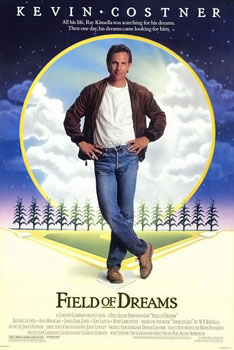
Field of Dreams is a 1989 American sports fantasy drama film written and directed by Phil Alden Robinson, based on Canadian novelist W. P. Kinsella's 1982 novel Shoeless Joe. The film stars Kevin Costner as a farmer who builds a baseball field in his cornfield that attracts the ghosts of baseball legends, including Shoeless Joe Jackson and the Chicago Black Sox. Amy Madigan, James Earl Jones, and Burt Lancaster also star.

Joseph Jefferson Jackson, nicknamed "Shoeless Joe", was an American outfielder who played Major League Baseball (MLB) in the early 20th century. Although his .356 career batting average is the fourth highest in the history of Major League Baseball (MLB), he is often remembered for his association with the Black Sox Scandal, in which members of the 1919 Chicago White Sox participated in a conspiracy to fix the World Series. As a result, Commissioner Kenesaw Mountain Landis banned Jackson from baseball after the 1920 season. During the World Series in question, Jackson had led both teams in several statistical categories and set a World Series record with 12 base hits. Jackson's role in the scandal, banishment from the game, and exclusion from the Baseball Hall of Fame have been fiercely debated.
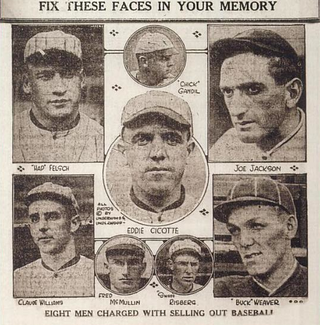
The Black Sox Scandal was a game-fixing scandal in Major League Baseball (MLB) in which eight members of the Chicago White Sox were accused of intentionally losing the 1919 World Series against the Cincinnati Reds in exchange for payment from a gambling syndicate, possibly led by organized crime figure Arnold Rothstein. There is strong evidence both for and against Rothstein's involvement; however, there is no conclusive indication that the gambling syndicate's actions were directed by organized crime. In response, the National Baseball Commission was dissolved and Judge Kenesaw Mountain Landis was appointed to be the first Commissioner of Baseball, given absolute control over the sport to restore its integrity.

William Joseph Skowron, nicknamed "Moose", was an American professional baseball first baseman. He played 14 seasons in Major League Baseball (MLB) from 1954 to 1967 for the New York Yankees, Los Angeles Dodgers, Washington Senators, Chicago White Sox, and California Angels. He was an eight-time All-Star and a five-time World Series champion.

Comiskey Park was a ballpark in Chicago, Illinois, located in the Armour Square neighborhood on the near-southwest side of the city. The stadium served as the home of the Chicago White Sox of the American League from 1910 through 1990. Built by White Sox owner Charles Comiskey and designed by Zachary Taylor Davis, Comiskey Park hosted four World Series and more than 6,000 Major League Baseball games. The field also hosted one of the most famous boxing matches in history: Joe Louis' defeat of champion James J. Braddock, launching his 11-year run as the heavyweight champion of the world.

Charles Albert Comiskey, nicknamed "Commy" or "the Old Roman", was an American Major League Baseball player, manager and team owner. He was a key person in the formation of the American League, and was also founding owner of the Chicago White Sox. Comiskey Park, the White Sox's storied baseball stadium, was built under his guidance and named for him.
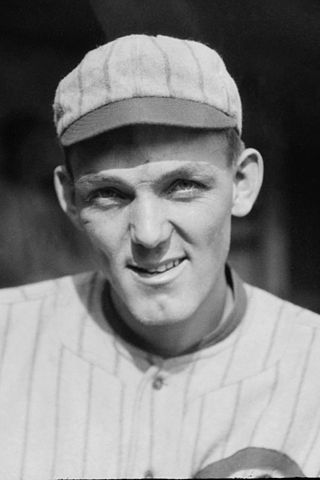
George Daniel "Buck" Weaver was an American shortstop and third baseman. He played in Major League Baseball (MLB) for the Chicago White Sox. Weaver played for the 1917 World Series champion White Sox, then was one of the eight players banned from the Major Leagues for his connection to the 1919 Black Sox Scandal.

The 1919 World Series was the championship series in Major League Baseball (MLB) for the 1919 season. The 16th edition of the World Series, it matched the American League champion Chicago White Sox against the National League champion Cincinnati Reds. Although most World Series have been of the best-of-seven format, the 1919 World Series was a best-of-nine series. MLB decided to try the best-of-nine format partly to increase popularity of the sport and partly to generate more revenue.
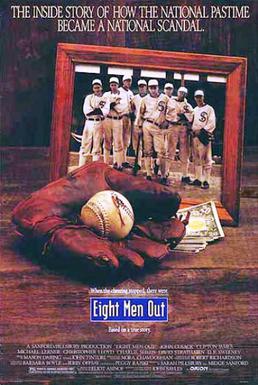
Eight Men Out is a 1988 American sports drama film based on Eliot Asinof's 1963 book Eight Men Out: The Black Sox and the 1919 World Series. It was written and directed by John Sayles. The film is a dramatization of Major League Baseball's Black Sox Scandal, in which eight members of the Chicago White Sox conspired with gamblers to intentionally lose the 1919 World Series. Most of the film was filmed at the old Bush Stadium in Indianapolis, Indiana.

Francis Joseph "Lefty" O'Doul was an American professional baseball player and manager. Though he spent eleven seasons in Major League Baseball, most notably for the New York Giants and Philadelphia Phillies, he is best known for his career in the Pacific Coast League, where he was a star player and a successful manager. His .349 career batting average is the sixth highest in the history of Major League Baseball (MLB).

Richard Henry Kerr was an American professional baseball pitcher for the Chicago White Sox of Major League Baseball. He also served as a coach and manager in the minor leagues.

Bibb August Falk was an American left fielder in Major League Baseball who played for the Chicago White Sox (1920–28) and Cleveland Indians (1929–31).

Minnesota Opera is a performance organization based in Minneapolis, Minnesota. It was founded as the Center Opera Company in 1963 by the Walker Art Center, and is known for premiering such diverse works as Where the Wild Things Are by Oliver Knussen and Frankenstein by Libby Larsen. Its latest commissioned piece and world premiere, The Fix – based on the story of “Shoeless” Joe Jackson, the Chicago White Sox, and their attempt to fix the world series. with music by Joel Puckett and libretto by Eric Simonson – was presented in February 2019. The President and General Director is Ryan Taylor, and the Artistic Director is Dale Johnson.

Shoeless Joe is a 1982 magic realist novel by Canadian author W. P. Kinsella that was later adapted into the 1989 film Field of Dreams, which was nominated for three Academy Awards.
Joel Puckett is an American composer. Joel completed his academic work at the University of Michigan, earning both a Masters of Music and a Doctorate of Musical Arts. His teachers include Michael Daugherty, William Bolcom, Bright Sheng, Will Averitt, and Thomas Albert.
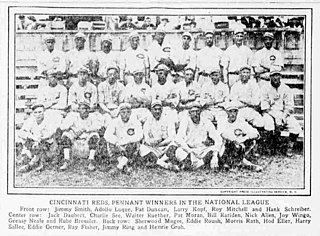
The 1919 Cincinnati Reds season was a season in American baseball. The Reds won the National League pennant, then went on to win the 1919 World Series. The team's accomplishments were overshadowed by the subsequent Black Sox Scandal, when it was discovered that their American League opponents, the Chicago White Sox had conspired to throw the series.
The 1919 Chicago White Sox season was their 19th season in the American League. They won 88 games to advance to the World Series but lost to the Cincinnati Reds. More significantly, some of the players were found to have taken money from gamblers in return for throwing the series. The "Black Sox Scandal" had permanent ramifications for baseball, including the establishment of the office of Commissioner of Baseball.
The 1920 Chicago White Sox season was a season in American baseball.
Eric Simonson is an American writer and director in theatre, film and opera. He is a member of Steppenwolf Theatre in Chicago, and the author of plays Lombardi, Fake, Honest, Magic/Bird and Bronx Bombers. He won the 2005 Academy Award for his short documentary A Note of Triumph: The Golden Age of Norman Corwin, and was nominated for a Tony Award for Best Direction of a Musical in 1993 for The Song of Jacob Zulu.
References
- ↑ "Minnesota Opera" . Retrieved February 26, 2019.
- ↑ Mellman, Larry (18 March 2019). "the opposite sox". Parterre Box. Retrieved 6 May 2019.
- ↑ Dunigan, Peggy Sue (20 March 2019). "BWW Review: MN Opera's Memorable THE FIX Composes Requiem for the American Dream". Broadway World. Retrieved 6 May 2019.
- ↑ Blain, Terry (18 March 2019). "Minnesota Opera batting above average with satisfying world premiere of 'The Fix'". Star Tribune. Retrieved 6 May 2019.
- ↑ Townsend, Terry (22 March 2019). "Potent Themes of Corruption in Two Strong Opera Performances – "The Mikado" & "The Fix"". Lavender Magazine. Retrieved 6 May 2019.
- ↑ Considine, Basil (17 March 2019). "REVIEW: Timely The Fix (MN Opera)". Twin Cities Arts Reader. Retrieved 17 March 2019.
- ↑ Hubbard, Rob (17 March 2019). "Review: Minnesota Opera's 'The Fix' swings for the mythical and misses". TwinCities.com. Pioneer Press. Retrieved 17 March 2019.
- ↑ Waleson, Heidi (March 18, 2019). "'The Fix' Review: An Opera Strikes Out". The Wall Street Journal. Retrieved 15 April 2019.
- ↑ Pamela Espeland (February 14, 2019). "NEA grants go to 42 Minnesota groups and artists". MinnPost . Retrieved February 25, 2019.